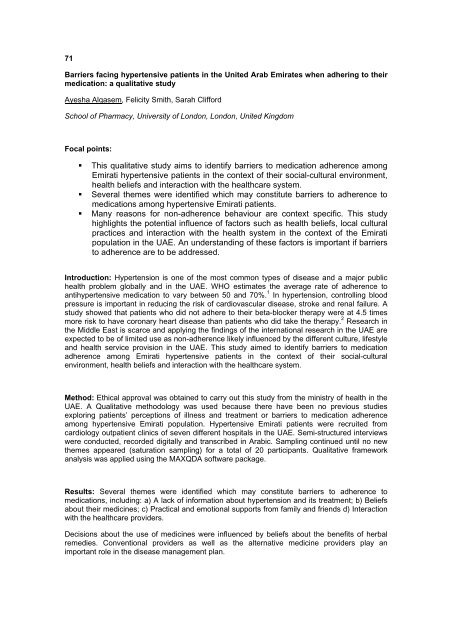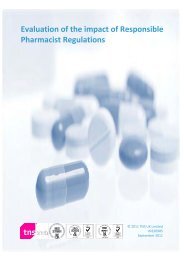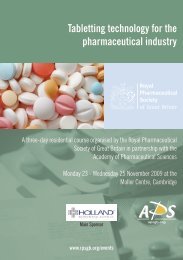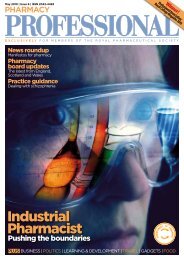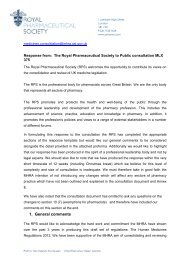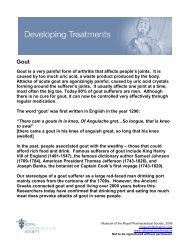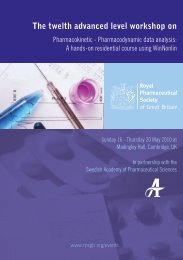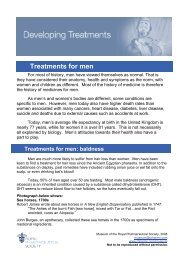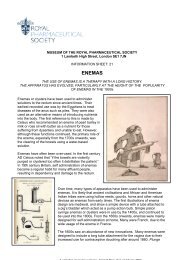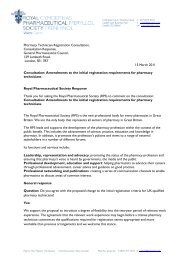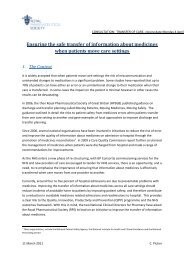RPS Conference 2010, Abstracts 2010 - Royal Pharmaceutical Society
RPS Conference 2010, Abstracts 2010 - Royal Pharmaceutical Society
RPS Conference 2010, Abstracts 2010 - Royal Pharmaceutical Society
Create successful ePaper yourself
Turn your PDF publications into a flip-book with our unique Google optimized e-Paper software.
71<br />
Barriers facing hypertensive patients in the United Arab Emirates when adhering to their<br />
medication: a qualitative study<br />
Ayesha Alqasem, Felicity Smith, Sarah Clifford<br />
School of Pharmacy, University of London, London, United Kingdom<br />
Focal points:<br />
• This qualitative study aims to identify barriers to medication adherence among<br />
Emirati hypertensive patients in the context of their social-cultural environment,<br />
health beliefs and interaction with the healthcare system.<br />
• Several themes were identified which may constitute barriers to adherence to<br />
medications among hypertensive Emirati patients.<br />
• Many reasons for non-adherence behaviour are context specific. This study<br />
highlights the potential influence of factors such as health beliefs, local cultural<br />
practices and interaction with the health system in the context of the Emirati<br />
population in the UAE. An understanding of these factors is important if barriers<br />
to adherence are to be addressed.<br />
Introduction: Hypertension is one of the most common types of disease and a major public<br />
health problem globally and in the UAE. WHO estimates the average rate of adherence to<br />
antihypertensive medication to vary between 50 and 70%. 1 In hypertension, controlling blood<br />
pressure is important in reducing the risk of cardiovascular disease, stroke and renal failure. A<br />
study showed that patients who did not adhere to their beta-blocker therapy were at 4.5 times<br />
more risk to have coronary heart disease than patients who did take the therapy. 2 Research in<br />
the Middle East is scarce and applying the findings of the international research in the UAE are<br />
expected to be of limited use as non-adherence likely influenced by the different culture, lifestyle<br />
and health service provision in the UAE. This study aimed to identify barriers to medication<br />
adherence among Emirati hypertensive patients in the context of their social-cultural<br />
environment, health beliefs and interaction with the healthcare system.<br />
Method: Ethical approval was obtained to carry out this study from the ministry of health in the<br />
UAE. A Qualitative methodology was used because there have been no previous studies<br />
exploring patients’ perceptions of illness and treatment or barriers to medication adherence<br />
among hypertensive Emirati population. Hypertensive Emirati patients were recruited from<br />
cardiology outpatient clinics of seven different hospitals in the UAE. Semi-structured interviews<br />
were conducted, recorded digitally and transcribed in Arabic. Sampling continued until no new<br />
themes appeared (saturation sampling) for a total of 20 participants. Qualitative framework<br />
analysis was applied using the MAXQDA software package.<br />
Results: Several themes were identified which may constitute barriers to adherence to<br />
medications, including: a) A lack of information about hypertension and its treatment; b) Beliefs<br />
about their medicines; c) Practical and emotional supports from family and friends d) Interaction<br />
with the healthcare providers.<br />
Decisions about the use of medicines were influenced by beliefs about the benefits of herbal<br />
remedies. Conventional providers as well as the alternative medicine providers play an<br />
important role in the disease management plan.


